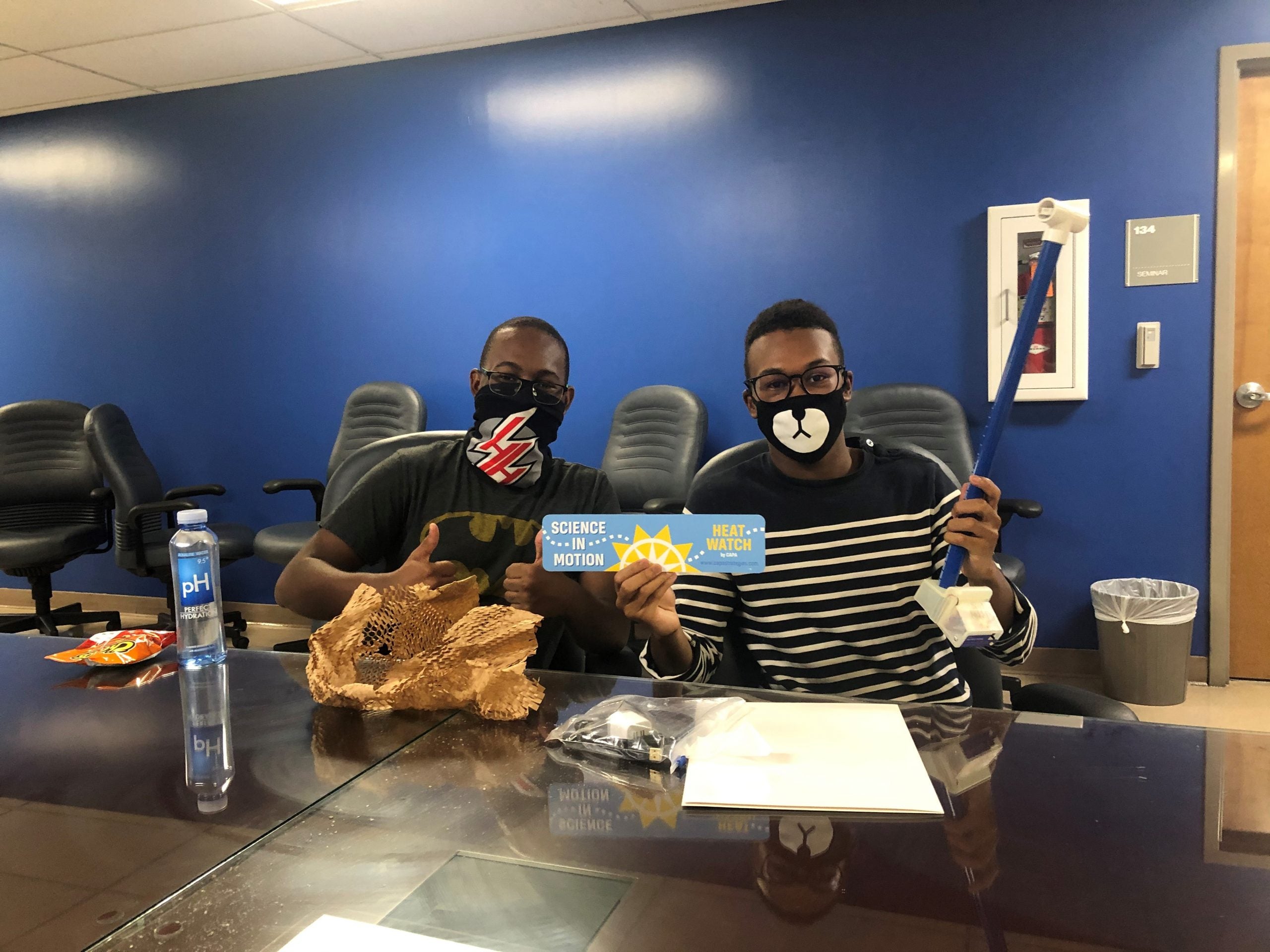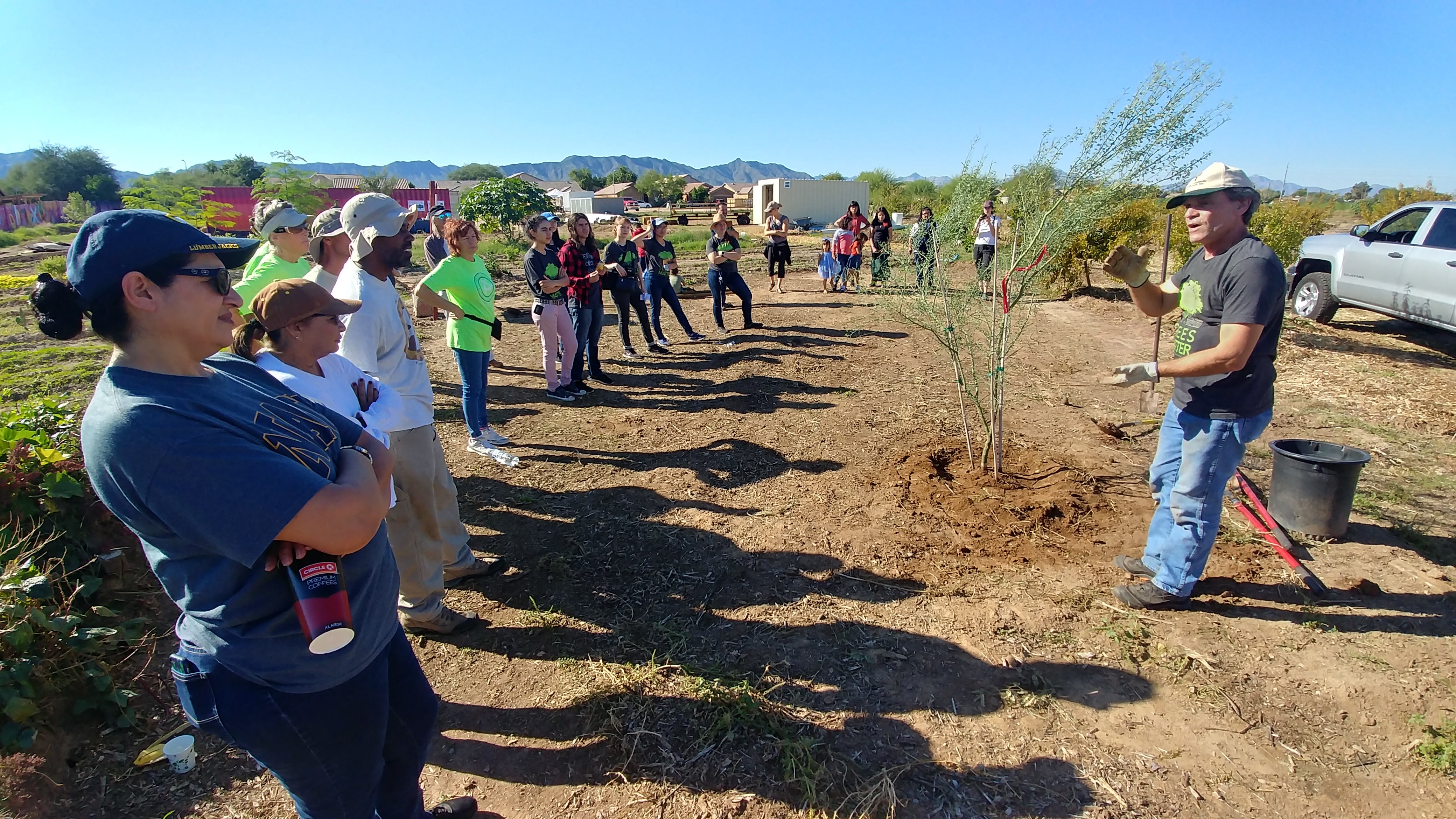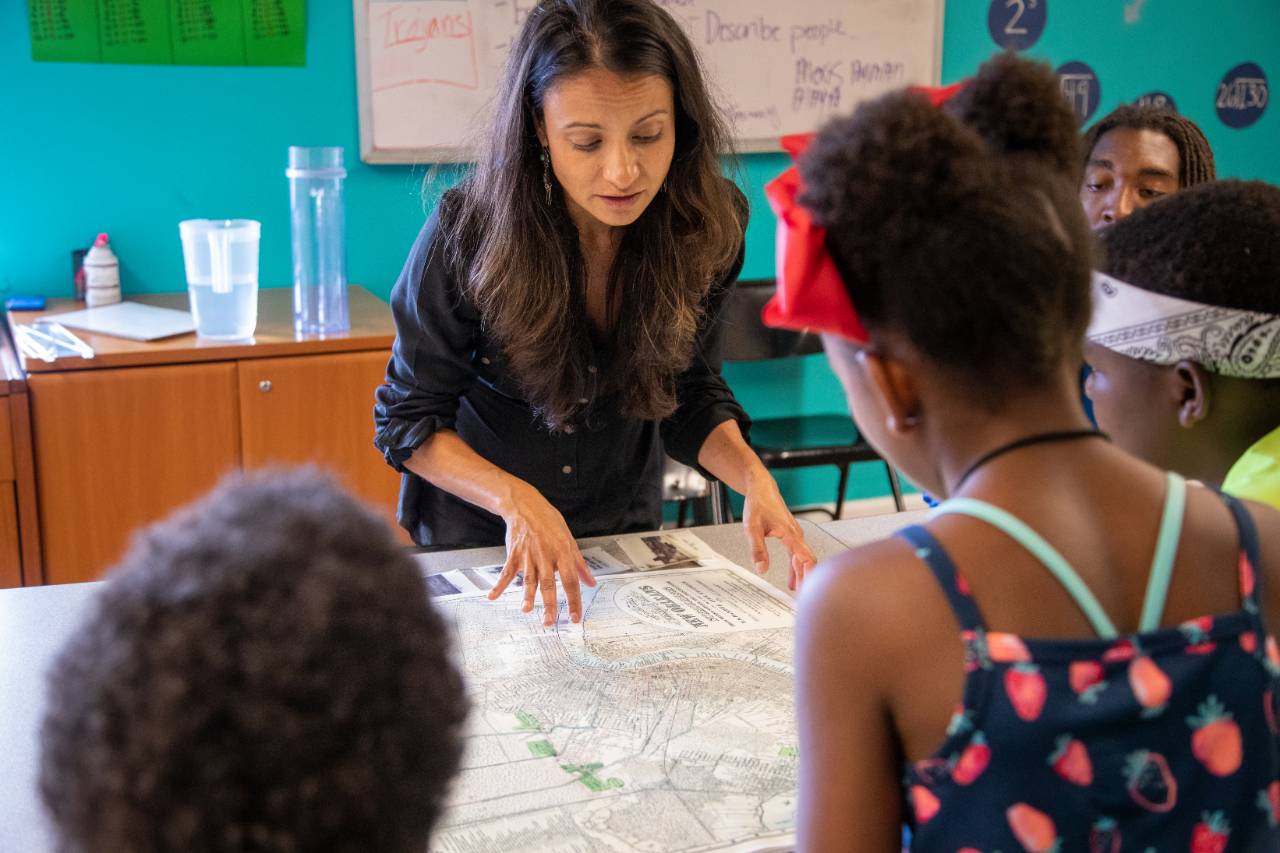Extreme heat, community science
Extreme heat is increasingly a serious public health issue in many parts of the world, including in Jackson, Mississippi.
2°C Mississippi, a Jackson-based climate change organization, is collaborating with city leaders, community members and other partners to pinpoint high-priority areas for new cooling centers and other heat mitigation and response measures. The group is also working with local schools on climate change curriculum.
Dominika Parry started her journey far from Jackson, Mississippi. Born in Poland, she earned her doctorate in environmental economics at Yale, moved to Madison, Wisconsin, and then relocated to Jackson a decade ago when her husband took a job at the University of Mississippi Medical Center.
Jackson, “The City With Soul,” is a place filled with history and culture, and has a vibrant art and music scene. It also has been subject to the country’s most extreme racial segregation, discrimination and violence, as well as white flight to the now affluent suburbs. This has led to one of the highest rates of poverty in the country and increased vulnerability to climate change-related disasters and public health impacts. As an economist deeply worried about the health impacts of a rapidly warming climate, Parry found that the science of climate change was significantly politicized in Mississippi. In some cases there was fear about bringing up the topic and in others a lack of awareness, stemming in part from attempts to block or confuse teaching in public schools about the reality and human causes of climate change, and from the many pressing needs absorbing people’s attention, including aging infrastructure like city water pipes.
But Parry soon found local allies who were also worried about and taking action on health and climate impacts, including in the political circles of Jackson, where a new mayor, Chokwe Antar Lumumba, won office based on a progressive platform of racial justice. He is a lawyer and the son of the late mayor and civil rights lawyer Chokwe Lumumba and his wife, Nubia Lumumba, both of whom were very influential in state politics and beyond.
Lumumba campaigned in 2017 on bringing improvements for the underserved and fixing the streets and broken sewer systems in a city strapped for cash. Recently, he added addressing climate change to his list of priorities.
“Extreme heat is not an equal opportunity threat,” Mayor Lumumba said at one of his public weekly briefings in February 2021. “It disproportionately affects people of color, young children, the elderly, socially isolated individuals and people with chronic health conditions or limited mobility.”
“Extreme heat is not an equal opportunity threat. It disproportionately affects people of color, young children, the elderly, socially isolated individuals and people with chronic health conditions or limited mobility.”
To support Jackson in addressing this threat, in 2017 Parry brought together health and education experts to form a nonprofit called 2°C Mississippi (referring to the United Nations goal of keeping the globe under a dangerous 2 degrees Celsius temperature increase). Her new organization has big plans to raise awareness about climate change, move toward solutions that also benefit the local economy and public health, and collaborate with others working toward similar goals.
Health impacts of extreme heat and its connection to climate change are a big problem in places like Jackson, where temperatures are above 95 degrees Fahrenheit for an average of 47 days a year, a rate that is projected to grow to 58 days per year by 2030. A quarter of the population in Mississippi lives below the poverty line, the highest rate in the nation, and there are many public health issues stemming from residents’ lack of access to quality health care, fresh food and education. Health experts say this is a recipe for disaster as temperatures ratchet higher.
Parry realized that a looming heat crisis should be the focus of her work in Jackson, which had no emergency heat plan in place to protect its approximately 160,000 residents. In early 2020, 2°C Mississippi teamed with Jackson’s then-chief administrative officer Robert Blaine on a “Leadership in Community Resilience” grant from the National League of Cities. Now working with the city’s new chief administrative officer, Marlin King, the partners have conducted a series of focus groups and meetings with Jackson residents to better understand how locals think about and prepare for dangerously hot conditions, conditions that will worsen significantly as the climate heats up.
“It’s part of our effort to provide grants to small and midsize cities in an effort to build capacity and build equitable outcomes,” says Anna Marandi, National League of Cities program manager for climate resilience and sustainability. “We loved their holistic approach, focusing on health, climate and justice and working closely with residents through focus groups and one-on-one surveys to understand their perceived heat risks.”
The grant helped kick-start the nonprofit’s engagement with the community on climate health issues. Within a few months, the city established a Climate Mitigation and Adaptation Taskforce to develop and implement climate change solutions, including the extreme heat preparedness plan that would protect citizens from extreme weather events and address climate justice in underserved areas of the city.
Parry and other experts realized they also needed data to figure out which neighborhoods within Jackson were most vulnerable to rising heat levels. The group received an urban heat mapping grant from the National Oceanic and Atmospheric Administration that allowed 2°C Mississippi to capture real-time temperature data throughout the city. Despite the challenges of data gathering during the COVID-19 pandemic, volunteers from the community collected temperature readings that were then used in models, collaborating with CAPA Strategies LLC, a data analytics firm that focuses on mapping heat distribution in communities around the U.S. The data allows the city to focus on areas that are most in need of low-cost plans for cooling centers with fans and ice that can keep people safe when heat emergencies arise.
The group’s efforts got a big boost in early 2021 when the City of Jackson, 2°C Mississippi and the National League of Cities partnered to secure a $475,000 grant from the Robert Wood Johnson Foundation to improve health and climate mitigation measures, as part of a $3 million initiative by the foundation to bring ideas from around the globe to address health, equity and climate change in U.S. cities. Jackson was one of six cities to receive the grant, drawing insights from climate mitigation programs and nature-based solutions in Barcelona, Spain; Havana, Cuba; and Okaya, Japan.
Karabi Acharya, senior director at the Robert Wood Johnson Foundation, says equitable and sustainable approaches in other countries offer inspiration for cities like Jackson to be resourceful and inclusive as they tackle the health impacts of climate change. “From the quality of our air to the levels of heat we’re exposed to, climate change threatens all the factors that shape our health and magnifies the inequities that prevent people from having a fair opportunity to live a healthier life,” Acharya says. “Advancing bold climate action in communities like Jackson is critical to build a healthier and more equitable future for all.”
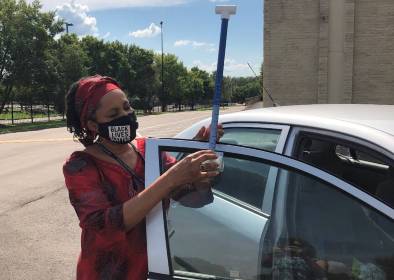
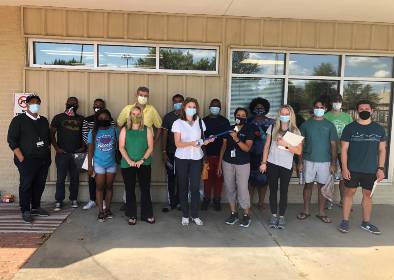
These are crucial solutions for climate conditions that will only get worse, says Alan Penman, a public health expert and physician at the University of Mississippi Medical Center and a board member for 2°C Mississippi. He says Jackson residents have endured decades of redlining and discrimination that make it difficult for many to afford air conditioning and other protective measures to combat the relentless heat. Low-cost cooling measures identified as part of the Robert Wood Johnson Foundation grant, such as creating more urban parks and green spaces, and the heat mapping efforts done with NOAA, have given local experts the tools to make a big difference in preparing for deadly heat events they know are coming.
Working with local community organizations such as One Voice, which works on environmental justice and energy issues, is an integral part of these efforts. “This is a social justice issue,” Penman says. “We don’t have accurate health statistics and a lot of people are medically underserved. … If we had a heat dome event like they had recently in the Northwest, we would have hundreds of excess deaths. We want more green infrastructure and better contingency plans to provide low-cost cooling centers and transportation.”
Including science-based information in its outreach is also critical, says Nsombi Lambright, executive director of One Voice. One Voice is working closely with 2°C Mississippi to identify neighborhoods most at risk from increasing extreme weather threats. “We all know it gets really hot here, but many people don’t know why,” Lambright says. “2°C Mississippi has the science resources to explain to people why these things are happening. That’s very important to our community.” This can help people draw connections between what they are experiencing in their own lives and the larger issue of climate change that they can take action on.
By creating neighborhood cooling centers, city officials say Jacksonians can also learn about other health and financial aid programs that promote better lifestyles. “We are in the early stages of planning, but our vision is these cooling centers could become like spokes in a wheel that connect people to city hall,” says Marlin King, Jackson’s chief administrative officer. As people come together to seek safer places, King says they can learn more about other services in the community, such as programs that provide aid for the homeless, disadvantaged children and the elderly.
Sandra Hindsman, a retired biology and life sciences teacher, grew up in Jackson and spent 40 years teaching in local schools. She is working with Parry to develop climate science curricula using low-cost materials to teach the basics of climate change. Hindsman and other teachers believe these basic science lessons can have big impacts as children learn more about what is happening around them. She says the community successfully reduced smoking by teaching children about the dangers of using tobacco, and many kids then convinced their parents to stop smoking. Now she hopes the same positive transition can happen by teaching kids about climate change.
Robert Blaine, the former Jackson chief administrative officer who was one of the leaders of Jackson’s resilience efforts, is now senior executive and director of the Institute for Youth, Education and Families at the National League of Cities. “We know that the conditions in the environments where families are born, live and work impact a wide range of health outcomes,” he says. “It’s crucial that the city act on behalf of her residents and address the ongoing threats of climate change with equitable and economically viable solutions that build a stronger community today and for generations to come.”
Story by: Rocky Kistner (July 2021)
Special thanks to Jennifer Hathorn and Elizabeth Crocker for serving as guest editors for this story.
Banner Image: Volunteers (Christopher Blaine and Robert Blaine, IV) setting heat mapping equipment. | Credit: 2°C Mississippi.
